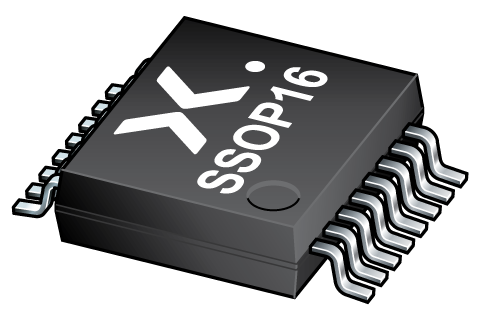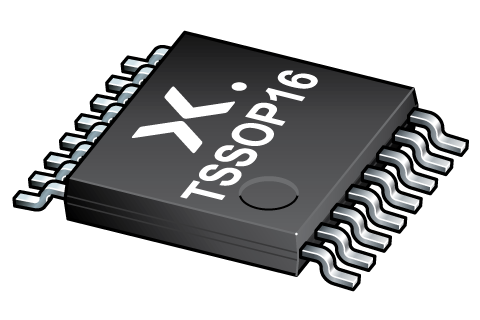
Register once, drag and drop ECAD models into your CAD tool and speed up your design.
Click here for more information74HCT109DB
Dual JK flip-flop with set and reset; positive-edge-trigger
The 74HC109; 74HCT109 is a dual positive edge triggered JK flip-flop featuring individual J and K inputs, clock (CP) inputs, set (SD) and reset (RD) inputs and complementary Q and Q outputs. The set and reset are asynchronous active LOW inputs and operate independently of the clock input. The J and K inputs control the state changes of the flip-flops as described in the mode select function table. The J and K inputs must be stable one set-up time prior to the LOW-to-HIGH clock transition for predictable operation. The JK design allows operation as a D-type flip-flop by connecting the J and K inputs together. This device features reduced input threshold levels to allow interfacing to TTL logic levels. Inputs also include clamp diodes, this enables the use of current limiting resistors to interface inputs to voltages in excess of VCC.
Schmitt-trigger action in the clock input makes the circuit highly tolerant to slower clock rise and fall times.
Alternatives
Features and benefits
J and K inputs for easy D-type flip-flop
Toggle flip-flop or "do nothing" mode
Wide supply voltage range:
For 74HC109: from 2.0 V to 6.0 V
For 74HCT109: from 4.5 V to 5.5 V
CMOS low power dissipation
High noise immunity
Input levels:
For 74HC109: CMOS level
For 74HCT109: TTL level
Latch-up performance exceeds 100 mA per JESD 78 Class II Level B
74HC109 complies with JEDEC standards:
JESD8C (2.7 V to 3.6 V)
JESD7A (2.0 V to 6.0 V)
74HCT109 complies with JEDEC standard JESD7A (2.0 V to 6.0 V)
ESD protection:
HBM: ANSI/ESDA/JEDEC JS-001 class 2 exceeds 2000 V
CDM: ANSI/ESDA/JEDEC JS-002 class C3 exceeds 1000 V
Specified from -40 °C to +85 °C and from -40 °C to +125 °C
Parametrics
| Type number | Product status | Package name |
|---|---|---|
| 74HCT109DB | End of life | SSOP16 |
PCB Symbol, Footprint and 3D Model
| Model Name | Description |
|---|---|
|
|
Package
All type numbers in the table below are discontinued. See the table Discontinuation information for more information.
| Type number | Orderable part number, (Ordering code (12NC)) | Status | Marking | Package | Package information | Reflow-/Wave soldering | Packing |
|---|---|---|---|---|---|---|---|
| 74HCT109DB | 74HCT109DB,112 (935186320112) |
Obsolete | HCT109 |

SSOP16 (SOT338-1) |
SOT338-1 |
SSOP-TSSOP-VSO-REFLOW
SSOP-TSSOP-VSO-WAVE |
Not available |
| 74HCT109DB,118 (935186320118) |
Obsolete | HCT109 | Not available |
Environmental information
All type numbers in the table below are discontinued. See the table Discontinuation information for more information.
| Type number | Orderable part number | Chemical content | RoHS | RHF-indicator |
|---|---|---|---|---|
| 74HCT109DB | 74HCT109DB,112 | 74HCT109DB |
|
|
| 74HCT109DB | 74HCT109DB,118 | 74HCT109DB |
|
|
Series
Documentation (7)
| File name | Title | Type | Date |
|---|---|---|---|
| AN11044 | Pin FMEA 74HC/74HCT family | Application note | 2019-01-09 |
| Nexperia_package_poster | Nexperia package poster | Leaflet | 2020-05-15 |
| SSOP16_SOT338-1_mk | plastic, shrink small outline package; 16 leads; 0.65 mm pitch; 6.2 mm x 5.3 mm x 2 mm body | Marcom graphics | 2017-01-28 |
| SOT338-1 | plastic, shrink small outline package; 16 leads; 0.65 mm pitch; 6.2 mm x 5.3 mm x 2 mm body | Package information | 2022-06-20 |
| SSOP-TSSOP-VSO-REFLOW | Footprint for reflow soldering | Reflow soldering | 2009-10-08 |
| HCT_USER_GUIDE | HC/T User Guide | User manual | 1997-10-31 |
| SSOP-TSSOP-VSO-WAVE | Footprint for wave soldering | Wave soldering | 2009-10-08 |
Support
If you are in need of design/technical support, let us know and fill in the answer form we'll get back to you shortly.
Models
No documents available
PCB Symbol, Footprint and 3D Model
| Model Name | Description |
|---|---|
|
|
How does it work?
The interactive datasheets are based on the Nexperia MOSFET precision electrothermal models. With our interactive datasheets you can simply specify your own conditions interactively. Start by changing the values of the conditions. You can do this by using the sliders in the condition fields. By dragging the sliders you will see how the MOSFET will perform at the new conditions set.

